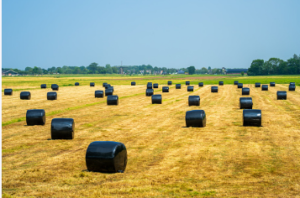If you need to safeguard your feed from oxygen and moisture without fear of breaking or tearing, opt for silage plastic that can last years of usage – especially if you plan on storing it outdoors. This most durable silage plastic will provide long-lasting protection.
 Most durable silage plastic are heavy-duty polyethylene plastic that can withstand the elements and last for years. Not only do they serve as essential permaculture tools for commercial growers, but anyone wanting to protect their garden from weather elements will find these tarps helpful too.
Most durable silage plastic are heavy-duty polyethylene plastic that can withstand the elements and last for years. Not only do they serve as essential permaculture tools for commercial growers, but anyone wanting to protect their garden from weather elements will find these tarps helpful too.
PVC
Polyvinyl chloride, commonly called PVC, is one of today’s most ubiquitous plastics. You’ll find it in shower curtains, toys, upholstery and school supplies, among other items.
This plastic is used in various agricultural applications, such as silage wrap that keeps hay or straw bales fresh during wintertime. It’s made of a durable plastic that resists moisture, UV light and other environmental elements that could spoil or rot forage.
It’s also widely used in the medical industry, as it’s a versatile material that can be sterilised using steam. It suits many applications, such as IV bags, oxygen/dialysis tubes, and disposable sample containers.
Due to its flexibility and durability, polyethylene is a widely-used material for silage packaging. It can be used in large and small bulk-bag sizes, is easy to handle, and withstands high pressure and temperatures.
Despite its many uses, PVC plastic is an incredibly hazardous substance that contaminates people and the environment throughout its entire lifecycle – from manufacturing to waste disposal. That is why consumers must recognise there are safer alternatives to PVC so they can begin gradually transitioning away from this hazardous material.
Bio-based plasticisers offer a safe and environmentally friendly alternative to PVC. These additives are created by fermenting plant and animal feedstock instead of chemically-based petroleum-based plasticisers, creating a phthalate-free option that’s less hazardous for human health and the environment. While these additives are still under development, they could help ease the transition from this toxic plastic.
Nylon
Nylon is one of the most rigid plastics used in agricultural applications and for producing fishing nets and automotive parts.
Nylon offers several advantages, such as high strength and excellent abrasion resistance. Furthermore, its recyclable nature makes it a popular material for various applications.
For instance, stretch fodder bags are frequently utilised to store and protect hay and corn outdoors for extended periods. Farmers appreciate this because it helps them reduce the amount of spoiled grain they must discard.
Furthermore, it’s an ideal way to keep livestock feed fresh and nutritious. The material is resistant to abrasions, heat, and water damage, making it the perfect solution for preventing feed from spoiling.
Nylon has the greatest strength and durability, plus it can be formed into complex shapes for use in various applications.
Another reason Nylon is a popular choice for silage storage is its weatherproof properties, making it suitable for storing grain and hay in silos. It can also be used to wrap bales, protecting them from moisture and external elements so they stay fresh longer.
Silage can benefit from sun protection, helping preserve its nutrients and quality. It is especially helpful when storing hay in silos as it prevents moisture from entering and spoiling the crop.
Nylon also offers superior protection against oxygen, making it ideal for farmers concerned with their animals’ well-being.
Nylon is your ideal choice if you need a durable and cost-effective product. This material comes in various dimensions, thicknesses, and colours to perfectly match your farm’s requirements.
Are you curious to discover more about Nylon? Then, get in touch with us today! We can assist in finding the ideal solution for your requirements.
Reinforced Polyethylene (RPE)
Silage covers are made of various material types, such as polyvinyl chloride (PVC), low-density polyethylene (LDPE), high-density polyethylene (HDPE) and reinforced polyethylene (RPE). RPE is considered the most durable plastic due to its multiple layers that offer superior tear and puncture resistance and specialised oxygen barrier properties.
These materials have many uses in agriculture and can be employed for several purposes, such as protecting feed and storing livestock. Furthermore, they shield crops from weather damage and reduce the likelihood of nutrient loss or spoilage.
They can be utilised for various applications, such as pond liners and grain bunkers. They cover large and smaller areas, too; installation is simple!
RPE is an ideal material for lining ponds due to its durability and resistance to punctures; it can last up to 40 years with no protective underlayment needed, making it suitable for ponds that hold large volumes of water.